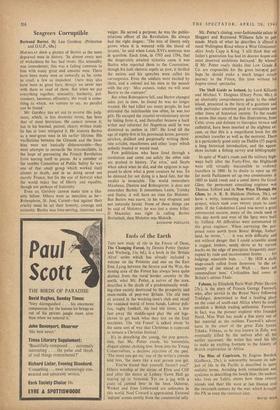Ends of the Earth
Tuts new study of life in the Forest of Dean, The Changing Forest, by Dennis Potter (Seeker and Warburg, I Is. 6d.), is a book in the 'Britain Alive' series which has already included a volume on the Potteries and one on the East End. Lying between the Severn and the Wye, the mining area of the Forest has always been quite distinct from the rural border country to the north; what Mr. Potter, a native of the area, describes is the death of a predominantly work- ing-class society destroyed by the prosperity and mass-media of post-war Britain. The old men sit around in the working-men's club and recall the vanished world of brass bands, Labour poli- tics, rugby football, the bad old times; a few feet away the middle-aged play the old legs- eleven to get back what they lost on the fruit machines. The 'old Forest' is talked about 'in the same sort of way that Christmas is supposed to remain a Christian festival.'
It's in describing the young, the pop genera- tion, that Mk. Potter excels, his bottomless disgust almost choking him. Some join the Young Conservatives, a decisive rejection of the past. 'The more you get on,' one of the writer's coevals told him, 'the more like a real person you get. . . . You've found that yourself, haven't you?' Others worship at the shrine of Elvis and Cliff and after the dance at Lydney Town Hall go tearing up to Symonds Yat on a jag with a crate of canned beer in the boot. Osborne, Wesker and Joan Littlewood are unknown in this world, Noel Coward is appreciated. External 'culture' comes mostly from the commercial telly.
Mr. Potter's closing, over-fashionable salute to Hoggart and Raymond Williams fails to per• suade. Much of what he describes' is alinOSI a rural Wellington Road where a West Gloucester' shire Andy Capp is King. '1 still think that my father's generation has had its dearest hopes and most deserved ambitions betrayed.' By whom? If Mr. Potter really thinks that Lew Grade 84 Co. are responsible for the great betrayal per- haps he should make a much longer return journey to the Forest, this time without his dogma-tinted spectacles
The Shell Guide to Ireland, by Lord Killanin and Michael V. Duignan (Ebury Press, 40s.), is an absolutely comprehensive guide' to the other island, presented in the form of a gazetteer and with particular attention paid to antiquities and other items of historical interest. To the reader it seems that many of the fine illustrations, from Celtic cross and dolmen to Georgian terrace and cathedral, have been inserted at the slightest ex- cuse, so that this is a magnificent book for the armchair traveller as well as the motorist. There is a particularly good entry on Dublin (55 pages), a long historical introduction, and the appen- dices include a fishing survey and bibliography.
In spite of Wade's roads and the military high- ways built after the Forty-Five, the Highlands were still virtually inaccessible to ordinary travellers in 1800. In its desire to open up the far north Parliament set up two commissions in 1803 to build roads and a canal down the Great Glen; the permanent consulting engineer was Thomas Telford and in New Ways Through the Glens, by A. R. B. Haldane (Nelson, 30s.), we have a witty, interesting account of this vast project, which took over twenty years to com- plete. If the Caledonian Canal was never a great commercial success, many of the roads used to this day north and west of the Spey were built by Telford. All difficulties were surmounted by the great engineer. When surveying the pro- posed route north from Bonar Bridge, Suther- land, he wrote, '. . . it was with difficulty and not without danger that I could scramble along a rugged, broken, sandy shore or by narrow tracks on the edge of precipices frequently inter- rupted by rude and inconvenient ferries . . for lodgings miserable huts. . . .' By 1828 a daily stage-coach rolled from Inverness `to the ex- tremity of the island at Wick . . . there are commodious inns.' Civilisation had come to Britain's ultima Thule.
Febana, by Elizabeth Paris Watt (Peter Davies, 25s.), is the story of Francis George Farewell, who, after service in the Royal Navy following Trafalgar, determined to find a landing place on the coast of south-east Africa where he could establish a British trading settlement. Farewell, in fact, was the pioneer explorer who founded Natal. Miss Watt has made a fine story out of her material as she outlines Farewell's adven- tures in the court of the great Zulu tyrant, Tshaka. Febana, as he was known in Zulu, was eventually killed by the natives after all his' earlier successes; the writer has used his life to make an exciting footnote to the history of British exploration in Africa.
The Blue of Capricorn, by Eugene Burdick (Gollancz, 25s.), is noteworthy because its sub• ject of life in the Pacific is described in quite realistic terms. Avoiding both romanticism and cynicism in describing the South Seas, the author, who lives on Tahiti, shows how these remote islands and their life were at last blasted into the twentieth century by the war, which brought the PX to even the remotest islet.
DAVID REE4


































 Previous page
Previous page